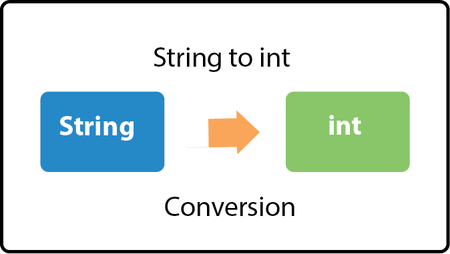

The most obvious solution is to scan the digits from right to left because the rightmost position is always the one’s place, the next to rightmost is always the ten’s, and so on.This enables us to start at the right end of the string with a place value of 1 and work backward through the string, multiplying the place value by 10 each time we move to a new place. That of "31" although it represents 300 in the first case and 30 in the second case. For example, the first character of "367" is identical to

#Java convert string to int without parseint how to#
Working through the digits left to right seems problematic because we don’t know what the place value of the first digit is until we know how long the number is. How to convert string to int in java without using integer parseInt() method : Code with example user inputs 12345 ,then it should give output 12345 as an. To convert string to integer, first we need to know what place value each digit must be multiplied by. Read Also : Count number of times each alphabet appears in the String : Java code with example If user inputs "-12345" ,then it should give output - 12345 as an int number If user inputs "12345" ,then it should give output 12345 as an int number Īs integer can be positive and negative, Here two case arises Simply use the built-in method JSONObjectgetInt(String), it will automatically convert the value to an int by calling behind the scene Integer.parseInt(String) if it is a String or by calling NumberintValue() if it is a Number. The slowest is the Apache method.We want to manually convert string to int without using parseInt() built in method. The Integer.parseInt () function parses the string argument as a signed decimal integer. String s '6', ss'99, sss '99999' i need to store these values in an int reference variable, without using Integer.parseInt. This is the most simple method to convert a String to an integer.

Scan the digits from right to left because the rightmost position is always the one's place, the next to rightmost is always the ten's, and next too. First, we need to know what place value each digit must be multiplied by. This is slightly faster than valueOf, as when your numbers are between -128 and 127 it will use the Integer cache and not create new objects. There are certain methods to convert a String to an Int in Java as mentioned below: 1. Convert String To Int In Java Without Using Integer ParseInt () First Approch To convert string to an integer. In your case Integer.parseInt (primary.getFullHex (), 16) wont work due to 0x prefix prepended by getFullHex () - get rid of and youll be fine. 10 is default and parses decimal numbers. The parseInt function in Javascript takes a string and converts it into an. By using 2 you can parse binary number, 8 stands for octal. convert number to integer javascriptConvert String to Number in JavaScript. This will return an int, but this can be auto-boxed to an Integer. If you really need to convert this bitstring to an integer then you need to do Integer.parseInt(string, 2) What you probably should do, if you really need to pass an integer, rather than the bitstring in string form is to pass the number as shown above and then, inside the routine that is going to use it do Integer. 16 means that you should interpret the string as 16-based (hexadecimal). Your best bet is to use Integer.parseInt.


 0 kommentar(er)
0 kommentar(er)
